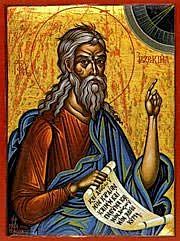
In looking recently at the parallels between Ezekiel and Revelation, I was struck by use of the term and motif of "exile". In Ezekiel, exile is explicit, as he states he is in exile with his countrymen. In Revelation it is implied, as John writes from the vantage point of "exile", banished to the isle of Patmos, "because of the word of God". Is there significance in the vantage point of exiles for both of these authors? Does this vantage point have any bearing on our life of faith, whether or not we are geographically "exiled"?
First, Ezekiel and John embodied the
situation of the people, before they
spoke to the people. Ezekiel was present physically with his exiled people, no doubt feeling the sting of their solitude and disorientation. John wasn't present with the people he served, but his state, the state of "exile", no doubt paralleled that of the people he attempted to reach. Second, both Ezekiel and John developed a theology of exile and wove that theology into their message. Not only this, but they
lived a theology of exile, embodying a faithfulness sustained by hope.
Is our context too different to warrant a connection to the example and exile theology of Ezekiel and John? Different, but not completely dissimilar. God's people today, no matter their setting or geographic location, are in a sense in "exile". It may not be a forced exile as in Ezekiel's day, or an imposed exile as in John's case, but as we long for the fullness of God's kingdom on earth, we realize our present circumstance is tainted by "exile". This present world doesn't completely align with God's promised reality and God's certain victory. Exile theology also places (sometimes thrusts!) God's people into the situation they are sent to address. Both Ezekiel and John saw the horrors a world in exile can produce, which no doubt gave them both the perspective of their God and the compassion necessary to
talk to people in a compelling way.
"Exile" is disorienting and unsettling. By nature it is uncomfortable. However, it is where we sit. But, will we grumble about our vantage point, or recognize the blessing of our vantage point. Both Ezekiel and John used their position as exiles to powerfully speak to the powers set at odds with God's kingdom, using any means necessary to reach exiles in the grip of those powers. May God help us to do the same.

